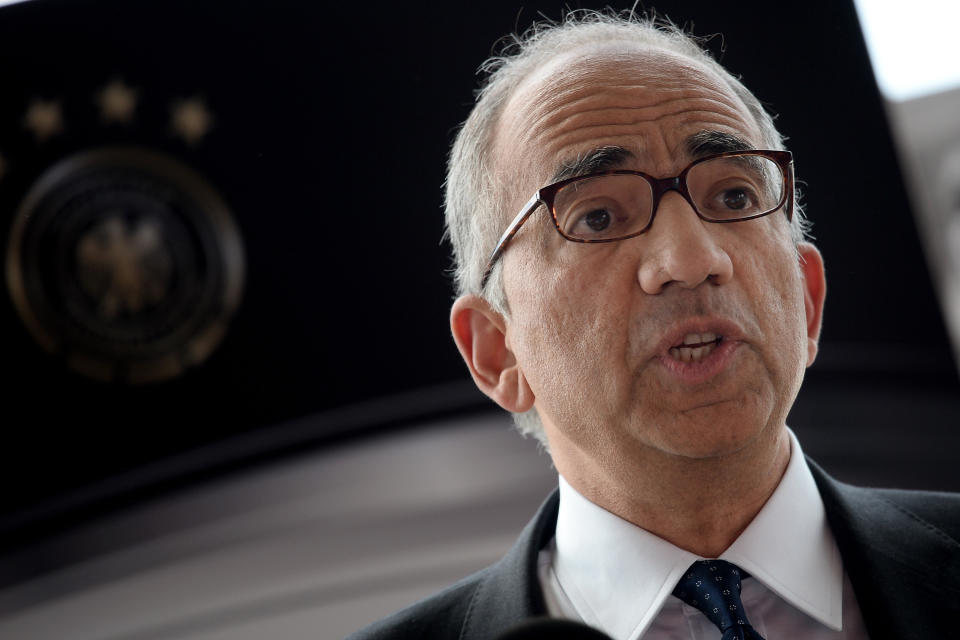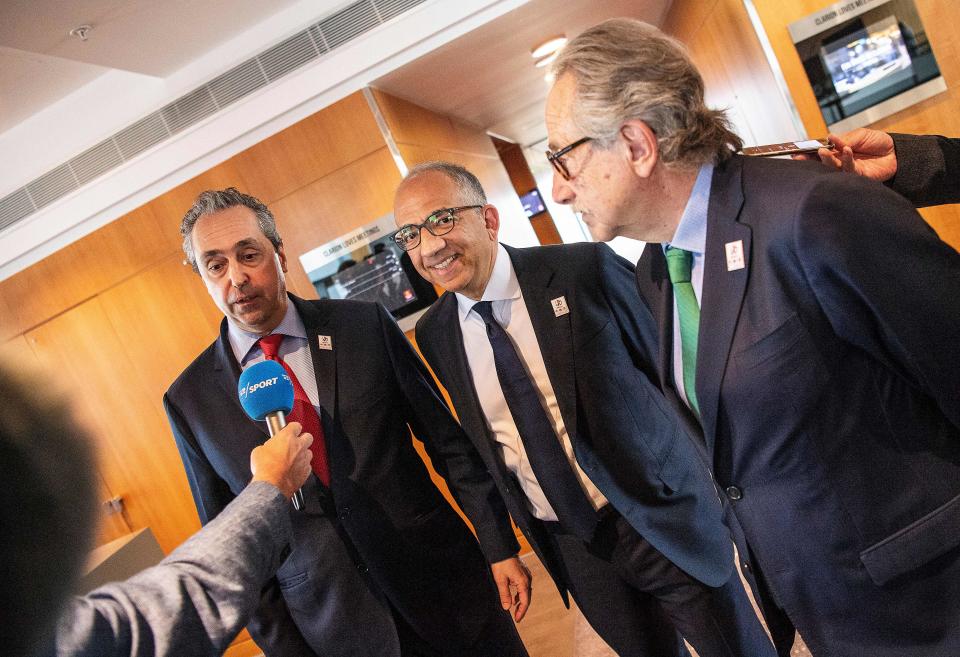Cordeiro's first 100 days: What has U.S. Soccer's new president been up to?
It makes sense that Carlos Cordeiro’s 100th day as the president of U.S. Soccer quietly came and went last week. The 62-year-old has kept a relatively low profile in the three-plus months since he won the most contentious election in the federation’s history, but that’s not to say he’s been easing into the job.
With the clock ticking steadily toward June 13, when a vote in Moscow by 206 of FIFA’s 211 member nations will determine if the United Bid — the joint effort between Canada, Mexico and the United States to secure hosting rights for the 2026 World Cup — is successful, Cordeiro has been as busy as any new head of state.
“During my campaign I talked about hitting the ground running,” Cordeiro said in an exclusive interview with Yahoo Sports. “I couldn’t have hit the ground running any faster. It’s been a marathon and a sprint all in one.”
Since assuming his post on Feb. 10, Cordeiro, along with the leaders of the Canadian and Mexican federations, Steven Reed and Decio de Maria, has traversed the globe trying to convince as many countries as possible to put their support behind the North American bid.
They’re leaving nothing to chance.
For maximum reach, the bid’s three co-chairs split up into teams, with Cordeiro, Reed and De Maria atop their own three- to five-team groups. In show of unity, each delegation features at least one representative from the other two countries.
With two weeks left in the race — Morocco is the only other bidder — they’ve made their case to roughly 70 percent of the voters. The hope is that by the June 13, they will have met every single one.
They decided to concentrate on their own backyard early on. Then, after locking in the endorsement of all 10 South American associations and most, if not all, of CONCACAF, the focus shifted to Asia.

Soccer officials from Canada, Mexico and the U.S. historically haven’t had much contact with their Asian counterparts, mainly because of the geographic distance between the two regions. Friendly matches versus European or South American foes happen regularly, while exhibitions against Asian teams are rare, at least on the men’s side.
But Asia has 46 voting members, meaning the huge and diverse continent will have a major influence on next month’s vote. The India-born, Miami-raised Cordeiro has lost count of how many times he’s traveled there in search of support, and that work appears to have paid off. Saudi Arabia said they’ll support the North Americans. Privately, other Asian nations have made the same pledge.
For the last month, the United Bid’s sights have been trained almost exclusively on Europe. Cordeiro and about a dozen USSF staffers have been based in London since the end of April. So too have Reed’s and De Maria’s teams, and for good reason. After all, Europe is where the bid will be won or lost.
That UEFA’s 55 members are in such close proximity has made it easier for the North Americans to make their pitch in person. In some cases, the three teams have visited five or six countries in a single day, an impressive feat considering that they’ve traveled exclusively on commercial aircraft.
“We have made presentations in as many as three countries in one day,” Cordeiro said of his own team. “That’s happened more than once. It’s an amazing logistical effort.”
[ Follow FC Yahoo on Twitter and Facebook ]
It’s one they hope will literally pay off. The promise of a record $11 billion in profits for FIFA has been a centerpiece of the North American bid. Each of FIFA’s member associations would share in those funds — no small incentive for a vote that, for the first time, will be made public.
Still, Morocco has received significant backing of its own. Much of Africa stands behind their CAF brethren. France also publicly endorsed its former colony’s effort. Other European nations might be swayed by the prospect of having World Cup games in prime time in their own time zones, so as to maximize television revenue.
But even countries that would seem to be no-hopers for the United Bid have been approached. Cordeiro and Co. are taking nothing for granted.
“I’ll tell you, associations really appreciate it when you come knocking on their door,” he said. “They all deserve to hear from us. And if we have the most compelling bid, the most technically superior bid, if we are generating the most revenue — which ultimately comes back to them for their programs at the grassroots level — at the end of the day this is what resonates with them.”
Surprisingly, Cordeiro said that geopolitics haven’t come up much in their discussions. That fact that the United States government has provided FIFA with written assurances that fans would be able to travel to the tournament regardless of nationality seems to have allayed fears stemming from U.S. president Donald Trump’s proposed travel ban, the fate of which will be determined by the Supreme Court in late June. Trump has publicly expressed his support of the bid on multiple occasions, as have Mexican president Enrique Peña Nieto and Canadian Prime Minister Justin Trudeau.

“When we’ve met with federations, they have mentioned that they are happy to see that we have strong support from the federal government from all three countries,” Cordeiro said. “This extends to visa, work permits, security, transportation and more. The fact that our president has so publicly endorsed the bid, and not just once, is an indication of the level of support we’re getting at the highest levels of government. That it has been so front and center in his thoughts is an indication of the level of support we have received from across the administration.”
Cordeiro’s first 100 days haven’t been spent solely on pursuing the dream of 2026, however. There’s been plenty to stay on top of back home. He sought the USSF presidency with an eye on reform, having announced his candidacy before the resignation of incumbent Sunil Gulati in the wake of the men’s national team failure to qualify for this summer’s World Cup in Russia.
And since emerging from the eight-candidate field, he’s overseen the early stages of what he calls a significant organization restructuring within U.S. Soccer. He’s been closely involved in the now almost complete process of hiring a general manager for the men’s team. He’s personally interviewed GM candidates. He’s just getting started and knows there’s lots more to do. For the next two weeks, though, the priority is clear.
“It’s a dash to the finish line here,” Cordeiro said. “At the end of the day you can’t forget it’s one country, one vote. No one is more important than anyone else. They’re all important. They all have their own challenges, much like we do.”
Having existing relationships with many of those he’s lobbying has helped. Cordeiro previously served as Gulati’s vice president and is no stranger in FIFA circles. Besides, the world of international soccer is small, believe it or not. Many of the bid’s staffers have known those at the federations they’re trying to win over for years, even decades.
“We have reinforced old friendships and made new ones,” Cordeiro said.
“We relate to each other when we talk about football. This is best done when people from the federation speak with colleagues form other federations. They want to talk to people in their language: the language of football.”
Doug McIntyre covers soccer for Yahoo Sports. Follow him on Twitter @ByDougMcIntyre.
More soccer from Yahoo Sports:
• 2018 World Cup preview hub
• Carlos Cordeiro’s first 100 days
• Inside the fascinating evolution of USMNT prospect Keaton Parks
• How Dave Sarachan, amid uncertainty, kick-started USMNT rebuild
• New USMNT generation of ‘clowns, social butterflies’ sprouting



